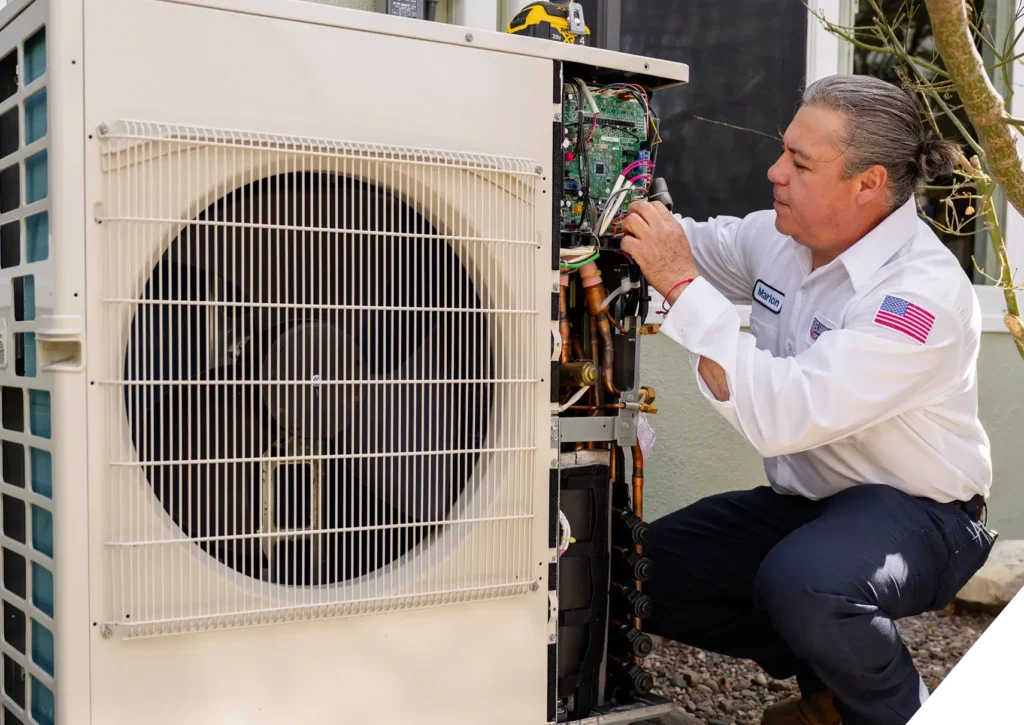If you are considering a new HVAC system for your home, you may have questions about which air conditioning system is best suited for you.
Even if you’ve done a bit of research, it can be difficult to know whether a gas or electric HVAC system is right for your home.
In this article, we’ll answer the question “Is AC gas or electric?” as well as other significant differences to understand about a gas or electric air conditioning unit.
We’ll explain the basic differences between an electric and a gas AC unit.
Whether you’re looking for an economical option or are planning with energy efficiency in mind, follow along as we explore all aspects of gas and electric HVAC units.
What Is An Electric HVAC Unit?
Electric AC systems are the most common type of air conditioning system and are powered exclusively by electricity. An electric AC unit operates on a vapor compression cycle, which is a highly efficient method involving a circulating refrigerant.
Common examples of electric AC systems include central air conditioning units, ductless mini-splits, window units, and heat pumps, which can also provide heating by reversing their operation.
Electric AC systems generally boast lower upfront installation costs, enhanced safety due to the absence of gas leaks or carbon monoxide, and lower maintenance requirements.
Electric AC systems produce no direct emissions, making them a cleaner choice with lower energy consumption, and many models feature high energy efficiency ratings (SEER). However, they rely on a continuous power supply, and some older models may be less effective at heating in extremely cold climates unless specifically designed as a heat pump.
One of the biggest reasons people often choose an electric AC system is its simplicity, low upfront costs, and lower energy bills. Electric AC units generally have a simpler installation process than gas systems, which require a gas line and specific venting.
This simplicity often translates to lower initial purchase and installation expenses for homeowners. On top of this, the components within an electric AC system are typically less intricate, contributing to their widespread availability and ease of manufacturing.
How Does an Electric AC Unit Work?
Warm indoor air is drawn over an evaporator coil, causing the liquid refrigerant to absorb heat and transform into a gas, thereby cooling the air that is then distributed throughout the home.
This refrigerant gas is compressed, increasing its temperature and pressure, before moving to the outdoor condenser coil. The refrigerant releases the absorbed heat into the environment and condenses into a liquid.
Finally, an expansion valve reduces the refrigerant’s pressure and temperature, preparing it to absorb more heat and restart the cycle.
What Is a Gas HVAC Unit?
Can air conditioning use gas? The answer is yes. Some advanced gas AC systems are indeed gas-fired heat pumps capable of both heating and cooling.
The advantages of gas AC include potentially lower operating costs in areas where natural gas is significantly cheaper than electricity, the ability to provide both heating and cooling from a single unit, and in some cases, continued heating operation during power outages. One downside, however, is that they may be noisier than their electric counterparts.
They can also offer higher cooling capacities, making them suitable for larger spaces. However, gas AC systems typically come with higher initial installation costs due to the necessity of gas line connections and entail more complex maintenance, involving components like burners, pilot lights, and valves.
How Does a Gas AC Unit Work?
Gas AC systems primarily utilize natural gas or propane as their energy source, though they typically require some electricity for fans and controls.
Rather than a compressor, these systems often use absorption or evaporative cooling.
This process uses a heat source derived from burning gas to drive the refrigeration cycle, often involving a solution like water and lithium bromide to absorb and release refrigerant vapor. Gas AC systems are often integrated into combined HVAC systems, where a gas furnace handles heating while the gas AC unit handles cooling.
Is an Electric HVAC Unit Better Than a Gas One?
Deciding between an electric or gas HVAC unit is important, as it is an investment in your home. While both types of units have their pros and cons, you may find one suits your needs better.
Electric AC System pros:
- Electric furnaces are generally less expensive than gas furnaces.
- Electric furnaces last 20-30 years.
- Electric furnaces are easy to care for.
- Electric air conditioners are generally less expensive to install compared to natural gas units.
- Electric air conditioners last 15-20 years.
- Electric HVAC units are better for the environment.
- High SEER rating electric AC systems can have reduce your energy cost
Electric AC System cons:
- Electric HVAC units will not operate during power outages.
- Electric air conditioners tend to require frequent repairs.
- Electric heat takes longer to heat your home.
- In most parts of the country, electric heat is more expensive.
- Electric furnaces can dry the air in your home.
Gas AC System pros:
- Gas-powered AC systems are more powerful.
- Gas HVAC systems are not as vulnerable to power outages.
- Gas air conditioners do not need many repairs.
- Gas units are versatile and pair well with other systems.
- Gas heaters will warm your home faster.
Gas AC System cons:
- Gas heating can lead to allergies and other health issues.
- Gas heaters have the potential to become fire hazards.
- Gas furnaces need a special venting system to release gases outside.
- Gas-powered air conditioning could emit carbon monoxide if it leaks.
- Gas-powered air conditioning costs more to run.
- Gas-powered air conditioning operates with noise.
Consulting with an HVAC technician can help you determine which unit is best for you, depending on where you live in the country and your family’s needs.
The CLEANair Furnace Rebate Program
In an effort to reduce greenhouse gas emissions, the state of California is embracing electrification. This shift towards electrification is part of an ongoing effort to meet California’s goal of achieving net zero carbon pollution by 2045.
This includes reducing statewide greenhouse gas emissions by 40% from 1990 levels by 2030. These initiatives are important steps towards improving air quality, conserving energy resources, and protecting the planet from the damaging effects of climate change. With this program in place, it is easier than ever for California residents to contribute to building a cleaner environment for generations to come.
To help move this process along, the CLEANair Furnace Rebate Program is offering single-family residences, multi-family properties, or small commercial buildings within an eligible zip code to receive up to $1500 in rebates when they replace their gas furnace with an electric heat pump.
Get Tax Credits When You Switch to an Electric HVAC Unit
The Inflation Reduction Act (IRA) of 2022 provides tax credits for consumers and businesses that will help them save money on energy when they switch to electric HVAC units. The act includes a number of credits and deductions that are designed to incentivize people to make the switch from traditional HVAC systems to electric ones.
When homeowners make a switch to a qualifying HVAC unit, they can receive up to 30% of the cost in tax credits. Not only can you make a switch to an energy-efficient HVAC unit, but you can also save while doing so.
Overall, the IRA is a comprehensive plan that seeks to reduce inflation while encouraging people and businesses to switch to more efficient and environmentally friendly electric HVAC systems.
At Reliable Home Comfort, we are dedicated to helping Los Angeles homeowners achieve comfort and satisfaction. With our licensed and certified HVAC technicians, we are focused on your satisfaction with every HVAC installation, repair, and maintenance need.
If you need expert AC system repair or installation in Los Angeles, call Reliable Home Comfort today on (562) 543-5987 or contact us online.


